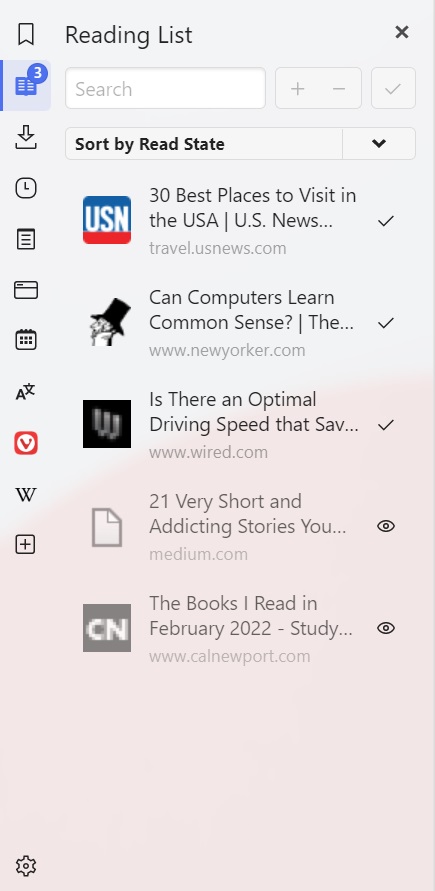Reading List Panel
This post is also available in:
![]() 日本語
日本語 ![]() Русский
Русский ![]() Français
Français ![]() Español
Español ![]() Deutsch
Deutsch ![]() Nederlands
Nederlands ![]() Српски
Српски ![]() Українська
Українська ![]() Português
Português ![]() Български
Български ![]() 简体中文
简体中文
Reading List allows you to add web pages to a list to keep for later. It prevents endless tabs from accumulating on your Tab Bar and Bookmarks being filled with entries you only need once.
Though, there are similar services out there, Vivaldi’s Reading List doesn’t require an Extension nor do you need to sign up for an account.
Access the Reading List Panel
To open the Reading List Panel:
- Click on the
 Reading List panel button on the side of your browser window.
Reading List panel button on the side of your browser window. - Go to the
 Vivaldi menu > View > Reading List Panel.
Vivaldi menu > View > Reading List Panel. - Type “Reading List Panel” in Quick Commands.
- Create a Keyboard Shortcut or a Mouse Gesture for the action.

Add pages to the Reading List
To add an open web page to the Reading List:
- Open the
 Reading List Panel.
Reading List Panel. - Click on
 Add Current Page at the top of the panel, near the search field.
Add Current Page at the top of the panel, near the search field.
Alternatively:
- Click on
 Show the Reading List on the Address Bar and then on Add Current Page.
Show the Reading List on the Address Bar and then on Add Current Page. - Type “Add Page to Reading List” in Quick Commands.
- Create a Keyboard Shortcut or a Mouse Gesture for the action.
- On a web page, right-click on a link and select Add Link to Reading List.
View and manage articles on the list
Open a saved article
To open an article from the Reading List:
- Open the
 Reading List Panel.
Reading List Panel. - Select an article you’d like to read.
- Double-click on the entry to open the article in a new tab.
Opened articles will be marked as read automatically.
Mark articles as read / unread
To mark an article read without opening it:
- Open the
 Reading List Panel.
Reading List Panel. - Select an unread article you’d like to mark as read.
- Click on
 Mark as read.
Mark as read.
To mark an article unread:
- Open the
 Reading List Panel.
Reading List Panel. - Select a read article you’d like to mark as unread.
- Click on
 Mark as unread.
Mark as unread.
Search articles
To find an article from the long list of saved pages:
- Open the
 Reading List Panel.
Reading List Panel. - In the top left corner of the panel, enter the search keyword in the Search field.
Sort Reading List
To change the sorting order of articles:
- Open the
 Reading List Panel.
Reading List Panel. - Click on Sort by [current sorting criteria] below the search field.
- Select either:
- By Title,
- By Read State,
- By Date Updated,
- By Address.
To reverse the order, click on Sort Ascending/Descending on the right side of the Sort by menu.
Remove articles from Reading List
You can remove both unread and read articles from the Reading List. To do that:
- Open the
 Reading List Panel.
Reading List Panel. - Select an article you’d like to remove from the list.
- Use one of the following options:
- Click Delete at the top of the panel, near the search field.
- Press the Delete key on your keyboard.
- Right-click on the entry and select Delete.
Reading List Panel settings
To open a page from the Reading List Panel with a single click, instead of a double-click:
To keep track of how many unread articles you have on your Reading List, make sure Show Unread Counter has been enabled in Settings > Panel > Reading List Panel. If the counter is a distraction untick the box.
Sync Reading List
Saved pages in your Reading List can be synced with Vivaldi on your other devices.
To sync your reading list:
- Go to Settings > Sync.
- Log in to your Vivaldi account.
- Sync either all data or make sure Reading List is enabled, when syncing only selected data.
Lists from different devices will be merged when synced.
Export and Import Reading Lists
Export the Reading List
To export your Reading List:
- Go to the
 Vivaldi menu > File > Export > Export Reading List.
Vivaldi menu > File > Export > Export Reading List. - Select the destination folder.
Alternatively:
- Type “Export Reading List“ in Quick Commands (F2 / ⌘ E).
- Create a Keyboard Shortcut or Mouse Gesture for the action.
The list will be exported as a CSV file.
Import a Reading List
To import a Reading List:
- Go to the
 Vivaldi menu > File > Import from Applications or Files.
Vivaldi menu > File > Import from Applications or Files. - From the drop-down menu select Reading List (CSV).
- Click Choose a File.
- Select the source folder.
Alternatively:
- Type “Import Reading List“ in Quick Commands (F2 / ⌘ E).
- Create a Keyboard Shortcut or Mouse Gesture for the action.